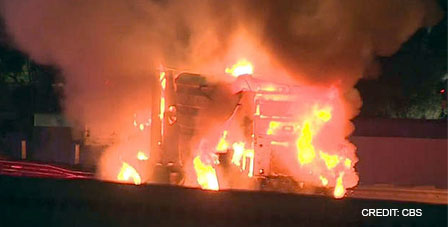Education and Training Can Mininmize Sweeper Fires |
|
by Ranger Kidwell-Ross posted September 2022

In early September the complete conflagration of a street sweeper in Los Angeles underscored the importance of exercising extreme caution when sweeping any place that might contain fire or the remains of fire.Through the years, the most prevalent cause of sweeper fires, at least when there wasn't an accident, has been careless operators cleaning up after large events. These include football tailgating parties, a season that is just starting, as well as many other kind of Festival-type events where someone has been barbecuing. Especially when not much water is being used for dust suppression, hot charcoal briquettes are able to catch smaller paper and other easily combustible materials on fire. In most instances, the fire is contained in the sweeper hopper. However, in some instances, the flames are fanned by the air circulation of the sweeper and create a hot enough fire that the entire sweeper can become engulfed in flames. Although this is a concern with any type of sweeper, gasoline-powered units have historically been at the most risk, since gasoline is more flammable than is diesel. As a move toward alternative fuels continues, the Los Angeles fire is a prime example of the increased seriousness of a fire with a CNG- or LPG-powered sweeper. In the instance of the fire shown above, the sweeper was sent out to clean up an oil spill on the freeway. Probably due to lack of operator knowledge or attention to detail, the sweeper picked up one of the burning flares California Highway Patrol had placed in the roadway. The Los Angeles area is under the jurisdiction of the South Coast Air Quality Management District, which no longer allows diesel-powered sweepers to be operated. As a result Caltrans, which is the lead agency responsible for Highway sweeping in California, began using sweepers powered by CNG. As may be seen by the photo of the fire, the sweeper became so highly engulfed in flames that fear of an explosion prompted the California Highway Patrol to shut down both sides of the freeway and physically take people out of their vehicles so they were further away from the intense fire and high chance of explosion. Gail Holsman, longtime owner of sweeper and garbage pickup companies in Kansas City, Missouri, said there's no question that LPG and CNG operation brings a higher level of fire and/or explosion in the event of an accident. He cited a trash truck accident where the operator hit a wall, causing an explosion that immediately engulfed the entire unit. Holsman went on to recommend that, in the event an operator suspects there is a fire anywhere on a sweeper, they should shut off the engines and get away from the vehicle before calling 911. On air sweepers, shutting off the sweeper engine will keep from fanning the flames. The same is true, to a lesser extent, by turning off the chassis engine, which typically has a radiator fan in operation. To minimize the possibility of fire, train your operators on best practices when sweeping anywhere fire might be an issue. Primary examples are college and pro football stadiums, festival events and similar. Fire extinguishers are mandatory for commercial trucks and buses and recommended in personal vehicles. So, be sure all of your rolling stock is equipped with a fire extinguisher appropriate for that type of vehicle. This allows the operator to extinguish small fires quickly so they cannot become large ones. Include training on what to do given fires in differing locations while on the job. Discuss tactics given where a fire might occur; i.e., a small exterior fire away from the fuel tank might be easily put out by the operator. However, when safety is an issue the operator should also put personal and bystander safety ahead of saving a vehicle. Note that most dry chemical extinguishers contain ammonium phosphate, which is used for multipurpose extinguishment. This chemical can cause mild eye and respiratory irritation so remind your team not to breathe the spray from an extinguisher. Scott Cerosky, long-time insurance provider to the sweeping industry, recorded a 5-minute video on this topic at the 2017 National Pavement Expo. At the time, his company insured a contractor that had three sweeper fires in just one year. This caused the insurer to get details about these and other sweeper fires that had happened to their customers.
Although some fires occur as a result of ruptured hydraulic lines, or a short in wiring, the company found that by far most were the result of sweeping up after tailgating parties at pro fields. "The sweeper would have a lot of paper and other easily combustible material in the hopper," said Cerosky, "and then it would pick up hot coals, creating a hopper fire." You may see the brief video Cerosky provided on the topic at this link, which is just one of 135 hints and tips when power sweeping.
If you have questions or comments for Kidwell-Ross, you may reach him at editor@ worldsweeper.com. If appropriate, we will append them to the article. |
© 2005 - 2022 World Sweeper
|
Street Contents
|